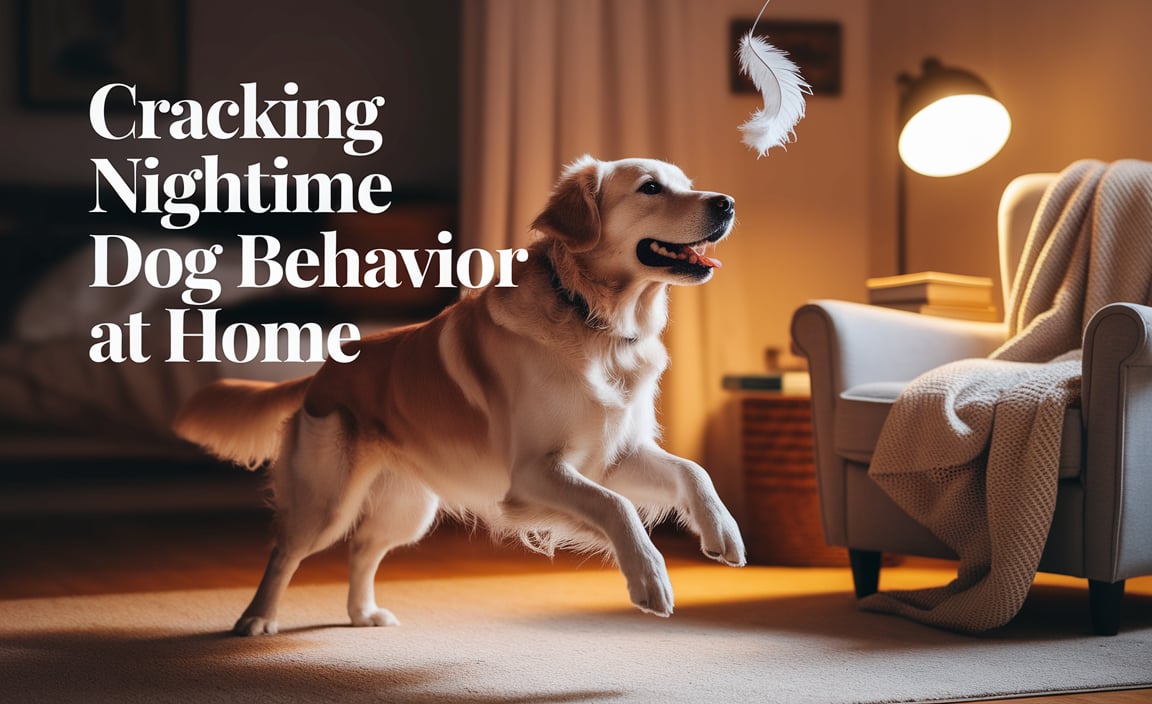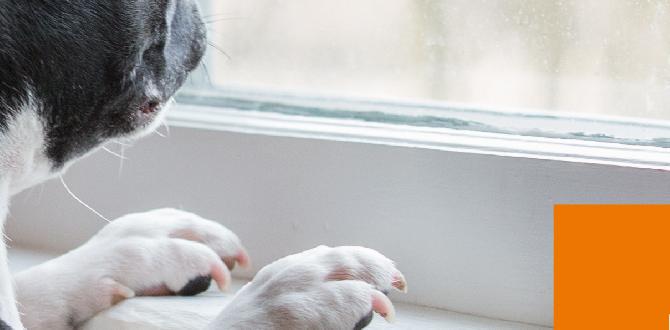Have you ever wondered why your dog behaves differently at night? Dogs can act in surprising ways once the sun sets. It’s like they have secret missions only they know about. Some dogs may bark or roam around. Others might snuggle up and sleep like logs. Understanding dog behavior at night at home can help you rest easy. Let’s explore what our furry friends do during their nighttime adventures.

Key Takeaways
- Nighttime routines can affect a dog’s behavior.
- Some dogs feel anxious during the night.
- Dog behavior at night at home includes barking and pacing.
- Providing comfort can help calm your pet.
- Observing behavior patterns is useful for pet owners.
Understanding Nighttime Dog Behaviors
Dogs have unique behaviors at night that might seem strange to us. Some dogs bark at shadows, while others may whine or pace. This behavior could be due to noises outside, their instincts, or simply a need for attention. Dogs are naturally alert, and nighttime can make them feel more protective or curious. Sometimes, it may be a sign that they need more exercise during the day. Knowing why your dog behaves a certain way can make nights more peaceful.
- Dogs are naturally more alert at night.
- Some bark at unfamiliar sounds.
- Whining may show anxiety or discomfort.
- Playing or pacing indicates energy.
- Comfort can reduce night-time anxiety.
Every dog is different, so their nighttime behavior will vary. It’s essential to observe and understand these actions. If your dog barks, it could mean they see something unusual. If they are restless, a bedtime routine might help. Playing with them before bedtime can tire them out, helping them sleep better. Remember, a calm dog means a calm night for everyone.
Fun Fact or Stats : Dogs can hear four times better than humans at night!
Why Do Dogs Bark at Night?
Does your dog bark at night when everything seems quiet? Dogs have sharp senses and might hear things we can’t. A squirrel, a car, or even a far-off siren could trigger them. Understanding this can help us be patient with our barking buddies. If barking becomes excessive, consider checking for causes or distractions. Teaching them commands or offering reassurance can also help.
Is Nighttime Anxiety Common in Dogs?
Have you noticed your dog pacing or whining at night? This could be a sign of anxiety. Just like humans, dogs can feel worried too. Changes in their routine or environment can cause stress. Offering a cozy bed or a favorite toy might soothe them. Sometimes, playing calming music or using a nightlight can make them feel safer.
Are There Solutions to Nighttime Pacing?
Does your dog walk around the house at night? This pacing can be due to excess energy. Ensuring your dog exercises enough during the day is crucial. Evening walks or playtime can help. A familiar and comfortable sleeping space can also reduce pacing. Sometimes, providing a small snack before bed can settle them down for the night.
Creating a Comfortable Sleeping Environment
A cozy environment can help ease dog behavior at night at home. When your pet feels safe, they are more likely to sleep soundly. Consider where your dog sleeps. Is it quiet and away from disturbances? Making their bed comfy with blankets can work wonders. Some dogs also appreciate soft music or white noise to lull them to sleep.
- Dogs need a quiet sleep area.
- Comfy beds help them relax.
- Soft music can calm anxious pets.
- Remove noisy distractions.
- Consider using a nightlight.
Dogs love comfort just as much as we do. A nice bed, a familiar toy, and a peaceful room can make a big difference. If your dog feels safe and happy, they are likely to settle down for a good night’s rest. You might notice they snuggle in more quickly and stay relaxed longer.
Fun Fact or Stats : Dogs sleep for about 12–14 hours a day!
Do Dogs Need a Nightlight?
Have you ever wondered if a nightlight could help your dog sleep? Some dogs feel more secure with a small light. It can prevent them from bumping into things if they wake at night. Older dogs, with declining vision, may find it especially helpful. A soft glow can make their environment more familiar and less scary. Consider trying a nightlight if your dog seems uneasy in the dark.
Should Dogs Sleep in a Crate?
Is a crate a good place for your dog to sleep? It depends on your dog’s needs. Many dogs feel secure in a crate because it’s like a den. Ensure it’s the right size so they’re comfortable. Some dogs may prefer more space. If your dog enjoys the crate, it can help with nighttime anxiety.
What Sounds Help Dogs Sleep?
Could certain sounds help your dog sleep better? Soft music or white noise can be calming. It masks unfamiliar noises that might wake them. Experiment with different sounds to see what your dog likes. Not all dogs react the same way, so find what works best for your pet. Music can transform their sleeping experience.
Signs of Disturbance During the Night
Recognizing signs of disturbance is crucial to understanding dog behavior at night at home. Some dogs might appear restless or anxious. They might pace or bark more than usual. Such behavior can indicate discomfort or fear. Being aware of these signs can help you address any issues promptly. Ignoring them might worsen the situation.
- Restlessness can hint at discomfort.
- Barking at odd times may signal fear.
- Watch for pacing or whining.
- Check for signs of distress.
- Address issues to prevent escalation.
It’s important to monitor your dog’s night-time activities. Any change in their usual behavior could indicate a problem. If your dog seems more anxious or restless, try to identify the cause. Maybe they need a more comfortable sleep area or more exercise during the day. Addressing their needs can lead to quieter nights for both you and your furry friend.
Fun Fact or Stats : Dogs may dream like humans, experiencing rapid eye movement (REM) sleep!
Why Do Dogs Pace at Night?
Do you wonder why your dog paces at night? Pacing can indicate that they are anxious or restless. It might be something they hear or sense, or simply excess energy. Ensuring they get enough exercise during the day can help reduce this behavior. Creating a calm environment is also essential for a peaceful night’s sleep.
Is Whining a Sign of Nighttime Disturbance?
Does your dog whine through the night? It often signals that something is bothering them. Maybe they are uncomfortable or feeling anxious. Checking their environment for any changes can help. Making their sleeping space more comfortable might ease their worries. Offering gentle reassurance can also help them settle.
How to Address Nighttime Barking?
Are nighttime barks keeping you awake? First, try to determine the cause of the barking. It could be an unfamiliar sound or a need for attention. Training and reassuring your dog can help reduce barking. Consistency is key. Over time, your dog will feel more secure and less likely to bark unnecessarily.
Managing Excess Energy Before Bed
Managing your dog’s energy is key to understanding dog behavior at night at home. A dog with too much energy might struggle to relax. Engaging in evening play sessions can help. Fetch or a brisk walk can tire them out. A tired dog is more likely to sleep soundly. Remember, a well-exercised dog is a happy dog!
- Play fetch or chase for exercise.
- Evening walks can tire your dog.
- Incorporate mental stimulation games.
- Physical activity aids in better sleep.
- A tired dog is a calm dog.
It’s essential to provide your dog with enough exercise. Without it, they might have pent-up energy that keeps them awake. Engage them in both physical and mental activities. This way, they feel satisfied and ready to rest at night. Investing time in play can lead to quieter nights for everyone.
Fun Fact or Stats : Dogs need at least 30 minutes of exercise daily!
Why Is Exercise Important for Dogs?
Why should you make sure your dog exercises enough? Exercise is crucial for their health and happiness. It helps them burn off extra energy, making them less restless at night. Whether it’s a game of fetch or a walk, exercise benefits their body and mind. A well-exercised dog will sleep better and be less likely to engage in disruptive behaviors.
What Are Fun Ways to Tire Out a Dog?
Looking for fun ways to tire out your dog? Play fetch, tug-of-war, or hide-and-seek. Puzzle toys can also stimulate their mind. These activities are fun and help burn energy. A well-tired dog is more likely to sleep soundly at night. Experiment with different games to see what your dog enjoys most.
Can Mental Games Help Dogs Relax?
Can mental games help your dog relax? Yes! Games that challenge the mind can be soothing. Puzzle toys require concentration and can tire them out. Try hiding treats for them to find. These activities engage their brain, making them feel satisfied and ready to relax. Mental games are great for winding down before bedtime.
Conclusion
Understanding dog behavior at night at home can improve life for both you and your pet. Observing your dog’s actions and needs makes nights more peaceful. Creating a comfortable environment, ensuring enough exercise, and addressing signs of anxiety are key. With patience and care, your furry friend will enjoy restful nights.
FAQs
Question: Why does my dog bark at night?
Answer: Dogs bark at night for various reasons. It could be due to unfamiliar noises, a need for attention, or simply because they are anxious or excited. Understanding dog behavior at night at home can help you identify the cause and address it effectively.
Question: How can I help my dog sleep better at night?
Answer: To help your dog sleep better, ensure they have a comfortable bed in a quiet area. Providing enough exercise and mental stimulation during the day can also help. Understanding dog behavior at night at home involves creating a calming environment to promote restful sleep.
Question: Is it normal for dogs to pace at night?
Answer: Pacing at night can be normal, but it might also indicate restlessness or excess energy. Ensuring enough daytime exercise and providing a comfortable sleeping space can help reduce pacing. Monitoring dog behavior at night at home allows you to address any underlying issues.
Question: Why does my dog whine during the night?
Answer: Whining at night can be a sign of discomfort, anxiety, or a need for attention. Check their sleeping environment and ensure they are comfortable. Offering reassurance can help them feel more secure and reduce whining.
Question: Are nightlights helpful for dogs?
Answer: Nightlights can help some dogs feel more secure, especially if they are anxious in the dark. The gentle light can make their environment feel more familiar, reducing fear and helping them settle down for the night.
Question: What should I do if my dog barks too much at night?
Answer: If your dog barks excessively at night, first determine the trigger. It could be an unfamiliar sound or a need for attention. Training, reassurance, and creating a comfortable sleeping environment can help reduce this behavior.
Meet Elyse Colburn, the devoted canine companion and storyteller behind the enchanting world of “Tales, Tails, and Adventures Unleashed.” A passionate dog enthusiast with a heart full of paw prints, Elyse Colburn shares heartwarming tales and insightful adventures, celebrating the joy, loyalty, and endless antics that make every dog a true hero. Join Elyse Colburn on this tail-wagging journey, where every post is a love letter to our four-legged friends.








